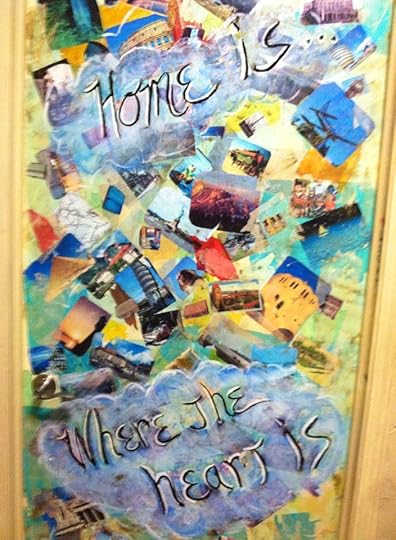The Magic of Transition
We moved. Again.
In 13 years of marriage, we can count the number of roofs we’ve lived under and number of states we’ve lived in like tallying up points in a game: the mint green 90-year-old house that was converted to 2 apartments (we lived in the small upstairs one); the cookie-cutter apartment next to a suburban beltway; a duplex on 88th Terrace and another duplex two doors down; the ranch style home on Twin Ridge Drive (we brought our first baby home there); the three-bedroom house with the French doors on Sunrise Street (we brought our second baby home there); a cheap and wide open subdivision home in a sleepy rural community; the 94-year-old brick home inside the limits of a major city (the first home we actually purchased).
Indiana. Kansas. Nebraska. California. Missouri.

Now, we are in a new home – another ranch, with an
add-on and the original house plans of a former owner who kept meticulous
records. We are in a new place – the Black Hills of South Dakota, where we showed
up knowing no one and where life is different in almost every way.
I used to think our story was unique. So many moves in
such a short span of time. So much change, so little permanence. People would
shake their heads and oohh and ahh over the many moves our family
endured since Bryan and I were married in 2006. But the more people I
encountered, the more I began to realize that they, too, had experienced change
in amazing doses – moves, roles, life events. Even my parents, who had lived in
the same house on the same street in the same town for 30+ years – eventually
moved, challenging my mom to think hard about how much home was really
tied to one specific place.

If you think broadly about the word transition, our
family is certainly not special. Transition happens every day, to everyone. Sometimes
it’s easy. Spring turns into summer. A child outgrows a pair of jeans.
Sometimes it’s hard. You say a goodbye that contains
no right words. You leave a comfort zone for an entirely new place – a new
house, a new job, a new community of people.
When our family left St. Louis in June bound for our new home where my husband would start his new job as pastor – a job he’s been working toward for the better part of a decade – our road was paved with frustration and tears. Goodbyes were hard. The miles were long. We had no idea what “the daily grind” would look like in western South Dakota.
But the journey also brimmed with excitement. What
would our new home look like? Who would we meet in this new place? How would
“the norm” here, less than 60 miles from the Wyoming border, compare to “the
norm” in St. Louis, whose metropolitan population is greater than the entire
state of South Dakota?
The magic of transition, for me, is that it is at once
terrifying and electrifying. You move into an unknown; you walk away from the
familiar. What’s more, transition is inevitable.
You and I both know: Change is all around us, all the
time. To paraphrase the Greek philosopher Heraclitus, the only thing constant
is change.
Because of that, we cannot fear change. If we do,
we’ll be living in fear our whole lives. Rather, we should expect change. That’s
not to say we can’t cherish what we have or mourn what we no longer have:
friends across the street, an old family tradition, youth. The magic of
transition is that you don’t know when the next change is coming. Because you
don’t know, the best thing you can do is to cherish and honor what you’ve got, today.
One of the biggest lessons Bryan and I have learned in
our years of moving and uprooting is to bloom, no matter what. We learned to
take root where we could and be there. That meant hanging pictures on
walls (no matter how long we thought we’d be under a certain roof). It meant
getting involved in the community, no matter how long we would call that
community ours. Perhaps most importantly, it meant going deep with people, not
being afraid to cultivate relationships even knowing that those relationships
might not last forever.

Here, in Rapid City, South Dakota, in the church where
we now belong and in the greater community of 70,000 people, we are trying to
do just that. We have come through another major transition and have emerged,
ready to plant strong roots. I dream of making this new place our
forever home.
Yet, there are no guarantees. In a robust reflection on change, David F. K. Mpanga wrote, “Do not tie your whole being to things that are bound to change.”
That means I can’t stake my whole being on where I
live – because I might not be here forever. It means I can’t stake my whole
being on my role as a parent – because one day, our kids (who rely on us for a
lot right now) will be grown and gone, real, thinking people who are making
their own moves on the world. It means I can’t stake my whole being on what I
do as a writer and editor – because the industry is in constant (you guessed
it) change and nothing is ever certain.
But it doesn’t mean we can’t live right where are, in
whatever geographical place, home, role or profession we’re in, with total
commitment. Today, this day, I will love my neighbor. I will tend to and
love my kids. I will write.
I am at work on a book that chronicles the challenges
and the joys of women who transition with their husbands through Seminary and
into their husband’s first pastoral call. As women in this season, we do not
lead; we follow. One wife at the Seminary put it this way: “In everything we do
here, we have to have an open hand.”
To hold up a cliché, bloom where you’re planted. But
at the same time, grab hold of each day with an open hand.
*What have been most meaningful transitions in your life?



